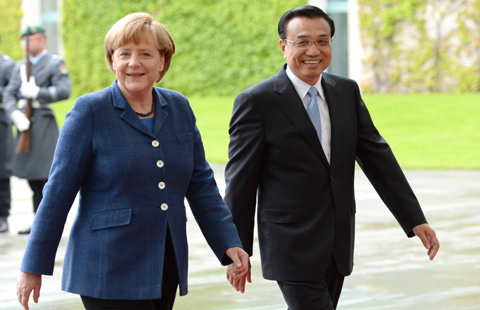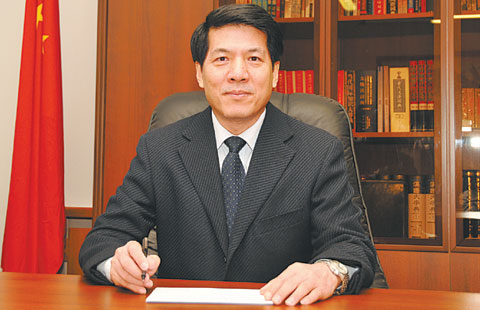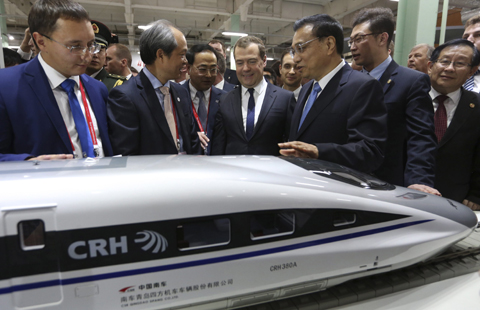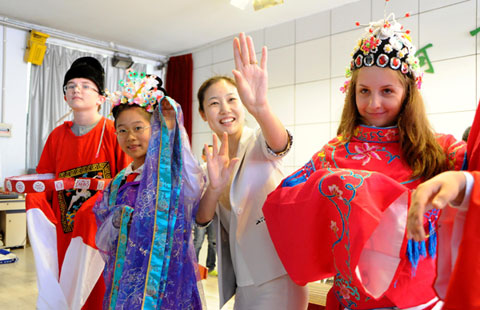Full text: Achieving common and inclusive development through innovation
Ladies and Gentlemen,
As each other's biggest neighbors, China and Russia have maintained the momentum of sound growth of bilateral relations at a high level. Last May, President Xi Jinping and President Putin signed the China-Russia Joint Statement on a New Stage of Comprehensive Strategic Partnership of Coordination. Yesterday, Prime Minister Medvedev and I co-chaired the 19th regular meeting of the prime ministers of the two countries, which produced rich results. China-Russia cooperation is steady, comprehensive and will continue well into the future. This points to huge potential for innovation and entrepreneurship in the two countries. In the new stage, China and Russia will provide stronger mutual support, open wider to each other, and take cooperation into greater depth. This will not only help the development and rejuvenation of each of our two countries, but also contribute to world prosperity and stability.
Both China and Russia have time-honored histories and profound cultures, which provides a rich source for innovation and creation. The Russian nation had produced many world-renowned scientists, writers and musicians, and the Chinese civilization had exerted a significant influence in the world. China and Russia are both strong in science and technology. China is pursuing the strategy of innovation-driven development, which has a lot in common with Russia's innovation-centered modernization strategy. The two countries both see the development of the other as its own opportunity. All this provides the favorable environment, conditions and popular support for cooperation in innovation, which holds out great potential for broadening and deepening such cooperation. When scientific innovation and cultural creation are pursued in the context of mutual learning between civilizations, and when China's advantages in industry, financial resources and market are combined with Russia's advantages in resources, science and technology and talents, it will generate a strong multiplying effect and spark a wildfire of innovation.
China and Russia have conducted innovation cooperation in many areas, and are well placed to take such cooperation to a higher level. To this end, I wish to make the following proposals.
First, strengthen cooperation in major projects of strategic significance. China and Russia have implemented a host of major cooperation projects in energy, resources, aviation, space, information technology, telecommunications, energy conservation and environmental protection. As we study and implement new projects, we may also explore innovative models of cooperation and work together to commercialize innovation outcomes and explore market opportunities in third countries through joint R&D, joint manufacturing and joint application promotion. Given China's advantage of competitive yet inexpensive equipment in a number of sectors, we are willing to take an active part in Russia's infrastructure development in high-speed railway and railway upgrading for win-win results. Our two sides have made breakthroughs in energy cooperation. Going forward, we need to move beyond the buyer-seller relationship and push for cross-holding of shares and upper- and lower-stream integration, so that our cooperation will reach a new height.
Second, deepen cooperation between non-governmental institutions and at sub-national levels. We need to strengthen people-to-people exchanges and enhance the collaboration between research institutions, universities and academic organizations. Our two countries have over 100 pairs of sister provinces and cities, the cooperation potential of which is yet to be fully tapped. In northeast China, many people speak Russian, and people in the Far East of Russia are also familiar with China. There is a lot more we could achieve by aligning China's efforts to revitalize its northeast and develop its west with Russia's drive to develop its Far East. The two sides may also work together to build joint innovation zones. China encourages its businesses to invest in Russia, and we also welcome Russian enterprises to grow their business in China.
Third, explore creative ways to support SME cooperation. The hundreds of thousands of SMEs in science and technology are an important driver for innovation. They need more convenient, flexible and accessible support. We need to better accommodate their needs in investment, financing, local currency settlement and intermediary services. For instance, we could build a "green channel" for SME innovation through the establishment of market-based venture capital systems and over-the-counter markets for technological property rights.
Fourth, substantiate the mechanisms for facilitating innovation cooperation. Well-established mechanisms can help sustain and deepen cooperation. We should take this forum as an opportunity to put in place dialogue and coordination mechanisms on policy innovation, investment environment and other issues, and establish a multi-tiered cooperation mechanism that involves businesses and social organizations, in order to provide a bigger platform for the cultivation of new highlights in our innovation cooperation.
Ladies and Gentlemen,
The young people are the most passionate about innovation. Here, I stand to invite the young people from Russia and other countries to the China Innovation and Entrepreneurship Competition next year, where you will have an opportunity to present your talent to the world. Next year is the Year of China-Russia Youth Exchange, and the Chinese government will give full support to the relevant activities.
As this is a forum themed on innovation, it gives us more reasons to hope for the future. We hope the spark of wisdom generated today will be turned into a blueprint for cooperation tomorrow and yield the fruits of win-win progress in the days beyond.
To conclude, I wish this forum a full success. Spasiba (Thank you)!
Related Stories
Premier Li Keqiang promotes innovation in Moscow speech 2014-10-15 09:15
Open innovation important in promoting common development, prosperity: Chinese premier 2014-10-14 19:47
Forum on innovation technologies to be held 2014-10-13 14:41
First Announcement of the International Forum on Intellectual Property & Self-Innovation 2006 Shanghai 2014-10-13 10:04
Review of International Forum on Intellectual Property & Self-Innovation 2005 Shanghai 2014-10-13 10:04
Background







